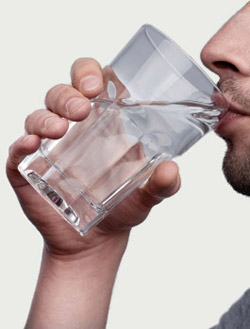
How much water should I drink daily?
Posted in Health & Wellness on July 13, 2012. Last modified on January 31, 2018. Read disclaimer.
Tips for staying hydrated
One indicator of dehydration is dark urine. This occurs because the kidneys are trying to maintain hydration by decreasing urine volume.
If you'll be sweating excessively during exercise, it is important to prehydrate (beginning at least 4 hours before exercise), maintain hydration during physical activity, and restore lost fluids afterwards. A rule of thumb is to drink 2-3 cups of fluid for every pound lost during the physical activity.
Beverages high in sugar hamper hydration and delay rebalancing of electrolytes. When rapid hydration is needed, one of the best choices is chicken broth or chicken soup. The high sodium content helps us rehydrate faster than drinking plain water or sweetened sports beverages.
Drinking small amounts of beverages frequently helps us to maintain hydration better than drinking large amounts less often.
Sugar-loaded sodas and alcoholic drinks do NOT hydrate the body but actually cause us to lose fluids.
Foods can also provide hydration. Some of the best (along with their water content) include: melons, strawberries, lettuce, cabbage, celery, spinach (90-99%); yogurt, apples, grapes, oranges, carrots and pineapple (80-89%); banana, baked potato and cooked corn (70-79%).
Source: Nevada Athletic Commission, Sickle Cell Disease: Information for parents, teachers and schools
No nutrient is as important to our health and even life as water. To understand why, you need to know some important facts about this substance that makes up about three-fourths of the human body. Water is key to many body functions, like transporting oxygen, nutrients and waste products into and out of the cells; digestion and absorption of nutrients, and supporting breathing.
Concerned about chemicals in plastics?
Amazon has low prices on
Rugged Stainless Steel
& Glass Water Bottles
Water is the foundation for most chemical reactions in the body, including: producing energy; cooling (helping regulate body temperature when we exercise, have a fever and are in hot environments) and cushioning between joints, in the spinal cord and in the brain.
Dangers of dehydration
What happens when the water balance is impaired? In addition to decreased bodily functions, insufficient long-term water intake could alter your mental and physical activity and promote kidney stones. In the short term it could lead to dehydration if other triggers are present like heat, fever, vomiting, diarrhea or diabetes. Dehydration is the loss of body water to the point where basic body processes are decreased. Symptoms of dehydration range from mild to severe, commonly starting with dry and sticky mouth, progressing up to lethargy and even coma.
Drinking fluids is usually enough to balance dehydration. When symptoms are more serious, electrolyte solutions available at pharmacies can be very useful. Avoid using sugar drinks (including sports drinks) that could worsen diarrhea. In severe cases of dehydration, intravenous fluids and a hospital stay may be necessary.
Since heat is a prime cause of dehydration, hot weather plus low water intake can be especially dangerous.
Symptoms of heat-related dehydration are heat cramps, heat exhaustion and even heat stroke, a life-threatening condition in which sweating stops and the pulse rate soars.
Clearly, it's a priority to keep our bodies hydrated during the summer. Eating a diet rich in fruits and vegetables helps but how much water should we drink? The Institute of Medicine of the National Academy of Sciences makes these recommendations for adults in order to stay hydrated and healthy (because of differences in age, metabolism, activity and environment, a more definitive average requirement for water is not possible):
- Women: about 9 cups daily from all beverages and foods.
- Men: about 13 cups daily from all beverages and foods.
Don't rely on thirst as an indicator of your water needs: older people tend to have a less sensitive thirst response and, therefore, tend to be more susceptible to dehydration. But even if you are younger, by the time you feel thirsty the body has already started to feel the burden. My best advice? Take a water bottle with you everywhere!
Source: Daniela Radulescu, M.D., Clinical research scientist in Sydney, Australia. Dr. Radulescu holds an advanced degree in molecular genetics, and has been involved in clinical research for investigational medicines for more than seven years.
